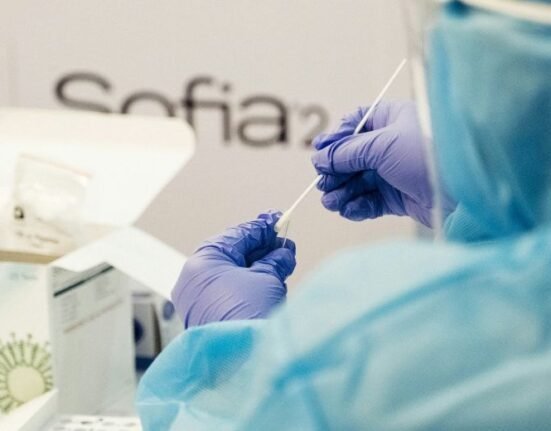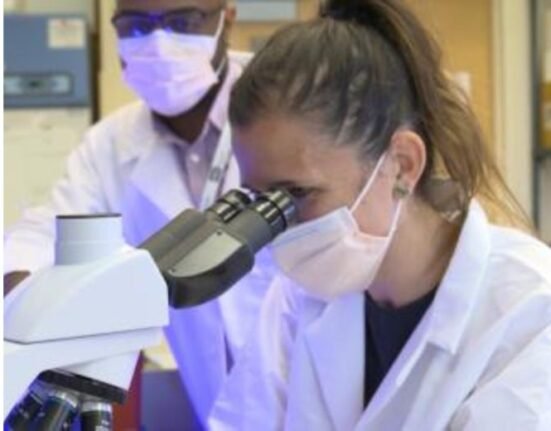HQ Team
October 2, 2023: A total of 770,875,433 (770.8 million) people globally have been infected by the coronavirus as of September 27 and 6,959,316 died due to the disease, according to the WHO.
The number of new cases fell by 55% during the 28-day period between August 28 and September 24 to 685,000 new infections, according to a WHO statement.
The number of deaths fell 34% as compared to the previous 28-day period with 1,900 fatalities being reported. About 117 nations are reporting new admissions to the intensive care units.
“The recent declining trend in the number of new cases reported globally should be interpreted with caution due to decreased testing, sequencing and reporting, alongside reporting delays in many countries.”
The WHO is currently tracking several SARS-CoV-2 variants, including three variants of interest (VOIs) – XBB.1.5, XBB.1.16 and EG.5 – and seven variants under monitoring (VUMs).
33.6% EG.5 variants
Globally, EG.5 represents 33.6% of sequences shared with GISAID and is presently the most prevalent VOI and has been reported by 73 countries.
More than 3 years since cases were first reported, the COVID-19 pandemic remains an acute global emergency, according to a policy update of the WHO.
“Many governments face uncertainties about how to prioritize at a time when the pandemic appears to be in transition but when the risk of emergence of new variants and future surges remains real.”
COVID-19 remains a major threat, and WHO urges Member States to maintain, not dismantle their established COVID-19 infrastructure.
It is crucial to sustain early warning, surveillance and reporting, variant tracking, early clinical care provision, administration of vaccine boosters to high-risk groups, improvements in ventilation, and regular communication, according to the statement.
Long COVID
Numerous studies have been done on the effects of Long COVID. A recent study funded by the National Institutes of Health found the virus can directly infect the arteries of the heart and cause the fatty plaque inside arteries to become highly inflamed.
This will increase the risk of heart attack and stroke.
Published in the journal Nature Cardiovascular Research, the study explains why certain people who get COVID-19 have a greater chance of developing cardiovascular disease, or if they already have it, develops more heart-related complications.
The researchers focused on older people with fatty buildup, known as atherosclerotic plaque, who died from COVID-19. As they found the virus infects and replicates in the arteries, no matter the levels of plaque, the findings could have broader implications for anybody who gets COVID-19.
“Since the early days of the pandemic, we have known that people who had COVID-19 have an increased risk for cardiovascular disease or stroke up to one year after infection,” said Michelle Olive, PhD, acting associate director of the Basic and Early Translational Research Program at the National Heart, Lung, and Blood Institute, part of NIH.
Coronory arteries
“We believe we have uncovered one of the reasons why.”
Though previous studies have shown that SARS-CoV-2 can directly infect tissues such as the brain and lungs, less was known about its effect on the coronary arteries.
Researchers were aware of the fact that after the virus reaches the cells, the body’s immune system sends in white blood cells known as macrophages to help clear the virus. In the arteries, macrophages also help remove cholesterol, and when they become overloaded with cholesterol, they morph into a specialised type of cell called foam cells.
If SARS-CoV-2 could directly infect arterial cells, the macrophages that normally are turned loose might increase inflammation in the existing plaque, said Chiara Giannarelli, PhD, and associate professor in the departments of medicine and pathology at New York University’s Grossman School of Medicine and senior author on the study.
They documented the release of molecules, known as cytokines, that are known to increase inflammation and promote the formation of plaque. The cytokines were released by infected macrophages and foam cells.
Small cohort
“This is just one more study that demonstrates how the virus both infects and causes inflammation in many cells and tissues throughout the body,” Ms Olive said. “Ultimately, this is information that will inform future research on both acute and Long COVID.”
Though the findings conclusively show that SARS-CoV-2 can infect and replicate in the macrophages of plaques and arterial cells, they are only relevant to the original strains of SARS-CoV-2 that circulated in New York City between May 2020 and May 2021, she said.
The study was conducted in a small cohort of older individuals, all of whom had atherosclerosis and other medical conditions. Therefore, the results cannot be generalised to younger, healthy individuals, she said.








